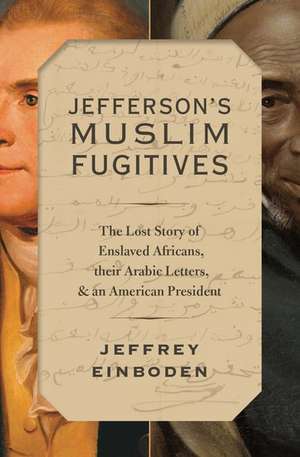Jefferson's Muslim Fugitives: The Lost Story of Enslaved Africans, their Arabic Letters, and an American President
Autor Jeffrey Einbodenen Limba Engleză Hardback – 25 aug 2020
Preț: 272.36 lei
Nou
Puncte Express: 409
Preț estimativ în valută:
52.13€ • 56.65$ • 43.82£
52.13€ • 56.65$ • 43.82£
Carte disponibilă
Livrare economică 20-26 martie
Preluare comenzi: 021 569.72.76
Specificații
ISBN-13: 9780190844479
ISBN-10: 0190844477
Pagini: 352
Ilustrații: 14
Dimensiuni: 236 x 155 x 28 mm
Greutate: 0.68 kg
Editura: Oxford University Press
Colecția OUP USA
Locul publicării:New York, United States
ISBN-10: 0190844477
Pagini: 352
Ilustrații: 14
Dimensiuni: 236 x 155 x 28 mm
Greutate: 0.68 kg
Editura: Oxford University Press
Colecția OUP USA
Locul publicării:New York, United States
Recenzii
The author has eloquently portrayed the interplay between specific American political undercurrents, especially during the early history of the US with the African representation of the Islamic culture in the North and West African regions from the 18th century onward.
...revelatory...His book offers even more for scholars eager to understand how Islam and Arabic figure into the early history of the United States.
[...] with such an enthralling premise as Arabic slave writings in the early United States — including archival jewels unearthed for the first time — the book makes a new contribution despite the odds. Einboden reveals a bank of forgotten moments tournants in which Islam and Arabic shaped America's founding.
Jefferson's Muslim Fugitives is a fascinating exploration of intersections between the lives of West African Muslim slaves and leading early American intellectuals. Using extraordinary and rare Arabic and English archival evidence, Einboden masterfully reconstructs the history of a number of these slaves, the circulation of their writings, as well as their impact on pivotal figures of early American history.
Taking as its point of departure previously unpublished letters by enslaved Muslims in America,Jefferson's Muslim Fugitives provides new perspectives on early America's engagement with Arabic and with Islam. Along the way it takes fascinating detours into American experiments with cyphers and secret codes, hypotheses about possible links between Arab and Native American cultures, and the bizarre story of how two Africans in Kentucky came to be accused of being spies. An erudite and intriguing study.
Einboden's adept sleuthing deciphers lost Islamic sources that recircuit the multilingual geographies of Jefferson's career. The scholarship embraids together wide-ranging conjunctions that dramatize how a deeper liberty requires the struggle to try to know the fugitive in all its human forms.
Einboden's groundbreaking work on the presence of Muslims in the United States uncovers previously unknown documents related to Thomas Jefferson and his circle. Einboden has developed a fresh and timely narrative that will stimulate conversation among a wide range of readers.
...revelatory...His book offers even more for scholars eager to understand how Islam and Arabic figure into the early history of the United States.
[...] with such an enthralling premise as Arabic slave writings in the early United States — including archival jewels unearthed for the first time — the book makes a new contribution despite the odds. Einboden reveals a bank of forgotten moments tournants in which Islam and Arabic shaped America's founding.
Jefferson's Muslim Fugitives is a fascinating exploration of intersections between the lives of West African Muslim slaves and leading early American intellectuals. Using extraordinary and rare Arabic and English archival evidence, Einboden masterfully reconstructs the history of a number of these slaves, the circulation of their writings, as well as their impact on pivotal figures of early American history.
Taking as its point of departure previously unpublished letters by enslaved Muslims in America,Jefferson's Muslim Fugitives provides new perspectives on early America's engagement with Arabic and with Islam. Along the way it takes fascinating detours into American experiments with cyphers and secret codes, hypotheses about possible links between Arab and Native American cultures, and the bizarre story of how two Africans in Kentucky came to be accused of being spies. An erudite and intriguing study.
Einboden's adept sleuthing deciphers lost Islamic sources that recircuit the multilingual geographies of Jefferson's career. The scholarship embraids together wide-ranging conjunctions that dramatize how a deeper liberty requires the struggle to try to know the fugitive in all its human forms.
Einboden's groundbreaking work on the presence of Muslims in the United States uncovers previously unknown documents related to Thomas Jefferson and his circle. Einboden has developed a fresh and timely narrative that will stimulate conversation among a wide range of readers.
Notă biografică
Jeffrey Einboden is Professor of English at Northern Illinois University and a 2017 Fellow of the American Council of Learned Societies. Einboden's most recent books include The Islamic Lineage of American Literary Culture (Oxford, 2016) and Islam and Romanticism (2014). He is the recipient of two fellowships from the National Endowment for the Humanities, including a 2011 award supporting Einboden's recovery, translation and teaching of Arabic slave writings.
